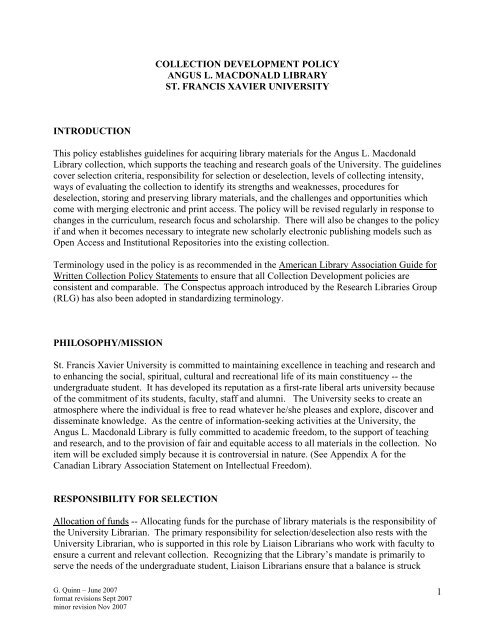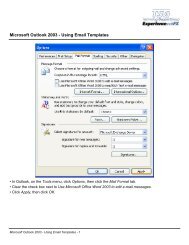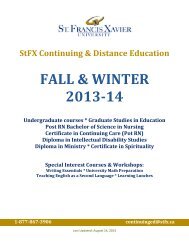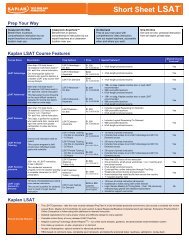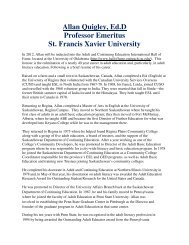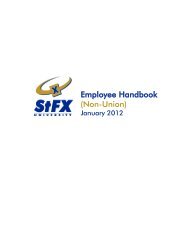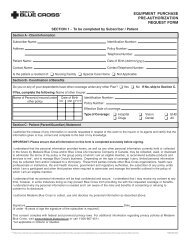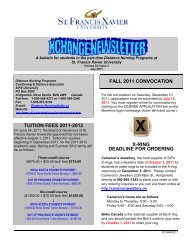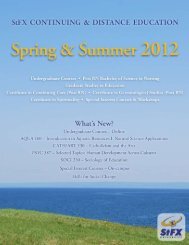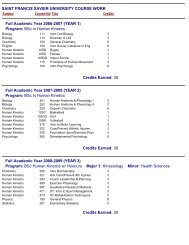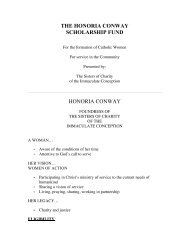Angus L. Macdonald Library's Collection Policy - St. Francis Xavier ...
Angus L. Macdonald Library's Collection Policy - St. Francis Xavier ...
Angus L. Macdonald Library's Collection Policy - St. Francis Xavier ...
Create successful ePaper yourself
Turn your PDF publications into a flip-book with our unique Google optimized e-Paper software.
COLLECTION DEVELOPMENT POLICY<br />
ANGUS L. MACDONALD LIBRARY<br />
ST. FRANCIS XAVIER UNIVERSITY<br />
INTRODUCTION<br />
This policy establishes guidelines for acquiring library materials for the <strong>Angus</strong> L. <strong>Macdonald</strong><br />
Library collection, which supports the teaching and research goals of the University. The guidelines<br />
cover selection criteria, responsibility for selection or deselection, levels of collecting intensity,<br />
ways of evaluating the collection to identify its strengths and weaknesses, procedures for<br />
deselection, storing and preserving library materials, and the challenges and opportunities which<br />
come with merging electronic and print access. The policy will be revised regularly in response to<br />
changes in the curriculum, research focus and scholarship. There will also be changes to the policy<br />
if and when it becomes necessary to integrate new scholarly electronic publishing models such as<br />
Open Access and Institutional Repositories into the existing collection.<br />
Terminology used in the policy is as recommended in the American Library Association Guide for<br />
Written <strong>Collection</strong> <strong>Policy</strong> <strong>St</strong>atements to ensure that all <strong>Collection</strong> Development policies are<br />
consistent and comparable. The Conspectus approach introduced by the Research Libraries Group<br />
(RLG) has also been adopted in standardizing terminology.<br />
PHILOSOPHY/MISSION<br />
<strong>St</strong>. <strong>Francis</strong> <strong>Xavier</strong> University is committed to maintaining excellence in teaching and research and<br />
to enhancing the social, spiritual, cultural and recreational life of its main constituency -- the<br />
undergraduate student. It has developed its reputation as a first-rate liberal arts university because<br />
of the commitment of its students, faculty, staff and alumni. The University seeks to create an<br />
atmosphere where the individual is free to read whatever he/she pleases and explore, discover and<br />
disseminate knowledge. As the centre of information-seeking activities at the University, the<br />
<strong>Angus</strong> L. <strong>Macdonald</strong> Library is fully committed to academic freedom, to the support of teaching<br />
and research, and to the provision of fair and equitable access to all materials in the collection. No<br />
item will be excluded simply because it is controversial in nature. (See Appendix A for the<br />
Canadian Library Association <strong>St</strong>atement on Intellectual Freedom).<br />
RESPONSIBILITY FOR SELECTION<br />
Allocation of funds -- Allocating funds for the purchase of library materials is the responsibility of<br />
the University Librarian. The primary responsibility for selection/deselection also rests with the<br />
University Librarian, who is supported in this role by Liaison Librarians who work with faculty to<br />
ensure a current and relevant collection. Recognizing that the Library’s mandate is primarily to<br />
serve the needs of the undergraduate student, Liaison Librarians ensure that a balance is struck<br />
G. Quinn – June 2007<br />
format revisions Sept 2007<br />
minor revision Nov 2007<br />
1
etween what is needed for instructional purposes and what is needed for faculty research and other<br />
needs. All material acquired with Library funds will be housed in the Library and not in<br />
departments/faculty offices.<br />
CONSTITUENCIES SERVED BY ST. F.X. UNIVERSITY<br />
The University's primary constituents are students and faculty. The majority of the students are<br />
engaged in full-time study at the undergraduate level. However, the number of part-time and<br />
extension students continues to grow. There are also graduate programmes, mainly in education<br />
and in a few science disciplines. A number of graduate courses, especially those in Education, fall<br />
under the University's Continuing & Distance Education Department. The Library’s commitment to<br />
distance students, who are often mature students, is reflected in the services provided by its<br />
Extended Library Services.<br />
Non-Constituent Clients<br />
The <strong>Angus</strong> L. <strong>Macdonald</strong> Library, being the only comprehensive library in the area, holds a unique<br />
position in North Eastern Nova Scotia. Increasingly, high school teachers are requesting library<br />
orientation tours for their senior students; indeed, such students also frequently seek to use various<br />
library services. They and other members of the surrounding community are viewed as important<br />
non-constituent users of the Library. However, material collected and services provided are<br />
designed for our primary clientele. Thus, although such patrons are welcome to use the Library,<br />
they are not entitled to some services, such as Interlibrary Loan.<br />
As a member of NOVANET (the Consortium of Nova Scotia Academic Libraries), ASIN (the<br />
Atlantic Scholarly Information Network), and because of the creation of Canada-wide Reciprocal,<br />
“in-person” borrowing privileges for faculty, staff and students (CURBA), the <strong>Library's</strong> clientele<br />
also includes patrons from other Canadian institutions.<br />
SELECTION CRITERIA<br />
Print – (books, periodicals/journals/magazines, continuations, Reference works). To avoid<br />
duplication, the purchase of multiple copies of books will not be undertaken unless heavy use of a<br />
particular work so warrants and if there is a need to have a copy of a book in more than one<br />
location. This might be the case for high demand titles which might also be on Reserve. The<br />
<strong>Angus</strong> L. <strong>Macdonald</strong> Library will not normally acquire a book already held by the Marie Michael<br />
Library unless it is absolutely necessary to do so.<br />
Highly priced items for the benefit of a few users will have to be approved by the University<br />
Librarian. The purchase of such items will, as a rule, not be encouraged.<br />
Whenever possible, the Library will acquire two copies of monographic publications by faculty.<br />
One copy will be kept in the main collection and the second will be considered an archival copy.<br />
G. Quinn – June 2007<br />
format revisions Sept 2007<br />
minor revision Nov 2007<br />
2
Book Formats – The internet has opened up many new and exciting opportunities for collection<br />
growth. Consequently, the collection is no longer limited to print formats, as the Library moves<br />
increasingly to the acquisition of scholarly resources in digital form, i.e., journals and e-books. The<br />
Library will consider factors such as currency, ease of access and cost when deciding on which<br />
format best meets the teaching and research goals of a discipline.<br />
Book suggestions for the collection can be made from the Library website; however, only<br />
suggestions from the University community are guaranteed to be followed up.<br />
Textbooks – The Library will not normally acquire textbooks.<br />
Replacement Copies – The Library will endeavour to replace missing items that are of core<br />
importance to the collection, but only after an exhaustive search of the collection to ensure that the<br />
items are truly missing. For all other missing items, replacement will depend on factors such as<br />
cost, usage and currency.<br />
Retrospective Collecting – While desirable for filling in the gaps in the collection, retrospective<br />
collection development will be undertaken rarely and only as funds permit. Expensive out-of-print<br />
books will not be an option except where an out-of-print book is regarded as being of primary<br />
importance to a discipline or to an academic library.<br />
Language – Material collected will, generally, be in English. Foreign language materials will be<br />
collected to support the teaching of French, Gaelic, German, Greek, Latin and Spanish courses.<br />
Translations of works of seminal value will be acquired as necessary.<br />
Serials – Periodicals/journals are the primary source of currency in academe. The Library<br />
subscribes to approximately 1000 print serial titles (including periodicals, magazines and<br />
newspapers). These use up a sizeable portion of the library budget. It is therefore important that<br />
there be some measure of commitment to continuation for every new serial title added to the<br />
collection The Library’s subscriptions to JSTOR and other digital archives obviate the need to<br />
purchase back-runs of print journals.<br />
Through a number of licensing and resource-sharing agreements, the Library also has access to<br />
thousands of electronic serials. The high cost of serials, as already noted, makes it imperative that<br />
there be little or no duplication of serial titles; therefore, print titles will be cancelled when the<br />
electronic equivalents are provided by stable vendors. Each discipline will, however, be looked at<br />
carefully before any cancellation decisions are made because the research needs of disciplines can<br />
be quite different.<br />
Reference – Works in this collection are for fast researching of important pieces of information.<br />
Reference works include a wide array of materials ranging from encyclopedias, directories,<br />
dictionaries, abstracts and indexes, to statistical and biographical information, concordances, guides<br />
and style manuals. The material in the collection is non-circulating. Some Reference works require<br />
constant updating to maintain currency. Many Reference sources are now available via the internet,<br />
G. Quinn – June 2007<br />
format revisions Sept 2007<br />
minor revision Nov 2007<br />
3
either free or for a fee. Updating is therefore automatic. The Reference Department will select and<br />
make these available as necessary. Other works, for example concordances, rarely need to be<br />
replaced. Some Reference books, even when they are superseded by another edition or year,<br />
remain invaluable as research sources, so the deselection (see section on deselection) of Reference<br />
sources must be undertaken with care. Librarians who remove material from the shelves because of<br />
its age must not assume the obsolescence of such material and must consult with the head of<br />
Research Services regarding the suitability of the material for integration into the circulating<br />
collection or for removal.<br />
Reserve – Books/papers held on reserve, with a few exceptions, come from the main collection and<br />
are usually selected by faculty, although librarians may decide to put heavy-demand and at-risk<br />
books on reserve for protection or as a precaution against loss.<br />
Rare Books – Rare Books are unique, unusual or uncommon books that are extremely valuable.<br />
They are usually older than most other books in the collection and often fragile. This, coupled with<br />
their uniqueness, is why they are usually kept away from the circulating collection and in a<br />
restricted area. The Rare Books at the <strong>Angus</strong> L. <strong>Macdonald</strong> Library are housed in the Bloomfield<br />
Room. This room is usually closed to the public. However, librarians from time to time provide<br />
guided tours of the room for those who wish to view the collection or use it for research. The<br />
library does not purchase rare books at this time. This could change if the need arises and when the<br />
decision is made to purchase a rare edition of a book or a facsimile thereof. The rarest item in the<br />
collection is a first edition of writings of the famous Latinist, the “Christian Cicero” (Lucius<br />
Caecilius Firmianus Lactantius, 260-c.340), published in 1524. There is also a valuable facsimile<br />
of the Gutenberg Bible. There is, as of now, no incunabula, i.e., pre 1500 material, in the<br />
collection.<br />
Government Documents – The <strong>Angus</strong> L. <strong>Macdonald</strong> Library is a partial/selective depository library<br />
for Government of Canada publications and a full depository library for Government of Nova<br />
Scotia publications. Important publications from other Provincial governments, primarily in the<br />
Atlantic region, are also collected. U.S. government publications are not acquired. However, U.S.<br />
documents can be obtained through Interlibrary Loan. Also, the increasing availability of internetbased<br />
documentation makes it easy for many important U.S. as well as Canadian and Provincial<br />
Government publications to be accessed through this medium.<br />
Theses/Dissertations – All senior class dissertations written at the University will be collected and<br />
recorded as and when they are received from faculty. All <strong>St</strong>. F.X. University graduate theses will<br />
also be added to the collection. Theses from other universities will not normally be collected. If<br />
for any reason such theses are acquired, the preferred format is microfiche.<br />
Special <strong>Collection</strong>s – The Fr. Charles Brewer Celtic <strong>Collection</strong>/Cruinneachadh Ceilteach an<br />
Urramaich Maighstir Charles Brewer, which is housed in a room off the Hall of the Clans on the<br />
third floor of the <strong>Angus</strong> L. <strong>Macdonald</strong> Library, is one of the most significant Celtic <strong>Collection</strong>s in<br />
North America. The collection is largely representative of the Scottish Gael but also includes the<br />
literature of the Scottish, Irish, Manx, Welsh, Cornish and Breton peoples. There is also some Nova<br />
Scotiana which the Library collects regularly. Aside from supporting the Celtic programme at the<br />
G. Quinn – June 2007<br />
format revisions Sept 2007<br />
minor revision Nov 2007<br />
4
University, the <strong>Collection</strong> is also used during the summer months by visiting scholars and others<br />
who come to conduct genealogical research. Some of the material in the collection is rare and<br />
valuable and is, therefore, kept in locked cabinets and can only be accessed by special permission.<br />
The collection is non-circulating, although some items may be signed out for use in the Library.<br />
The room has a sizeable reading area which patrons can use for research purposes. Responsibility<br />
for acquiring Celtic/Gaelic material is split between the Library and the Celtic <strong>St</strong>udies department.<br />
For help with using this unique collection please contact the Celtic <strong>Collection</strong> Librarian.<br />
Gifts – The Library reserves the right to accept or reject gifts/donations and to integrate such items<br />
into the collection as long as they meet the same selection criteria as for items purchased by the<br />
Library. In this regard, library staff reserve the right to check on the age and editions of potential<br />
donations to ensure that what is accepted is relevant. Large donations for which tax receipts are<br />
required will only be accepted if the donor complies with Revenue Canada regulations, which<br />
stipulate that valuations of such donations are the responsibility of the donor. The Library does not<br />
consider it an undue burden on donors to ask them in advance for a list of items they wish to<br />
donate, so that library staff can select those items which enhance the collection and contribute to<br />
the furtherance of the University’s teaching and research goals. Memorial donations: The Library<br />
acknowledges the devotion and dedication behind memorial donations of books. Space constraints,<br />
however, make it imperative that such donations be subjected to the same selection/deselection<br />
criteria used for other items. The Library reserves the right to sell, exchange or discard gifts which,<br />
even after acceptance, it finds it cannot use. Monetary gifts are always welcome and are useful for<br />
filling in gaps in the collection. A detailed Gifts/Donations policy is available on the Library’s<br />
website.<br />
Archives – (See The <strong>St</strong>. <strong>Francis</strong> <strong>Xavier</strong> University Archives website for collection procedures for<br />
Archives -- http://library.stfx.ca/content/archives/).<br />
Music/Microform Room – Music scores, CD's audio/video recordings and other non-text materials<br />
which support instruction/research in the music department are kept in the Music Room. The<br />
preferred acquisition format is CD and DVD. Audio and video recordings acquired to support<br />
instruction/research in other disciplines are also housed in the Music Room since the necessary<br />
equipment, i.e., record players, tape recorders and CD players, are only available in that room.<br />
Some of this material circulates. Requests for additions to the material come from faculty but are<br />
carefully scrutinized to ensure that each request complies with library selection criteria.<br />
Microforms – The microform collection consists of both film and fiche. These materials are noncirculating.<br />
There are no filmstrips or slides in the collection at this time. Technological<br />
advancements in the future may make it necessary for the Library to review this area as sound,<br />
images and video increasingly become part of the library of the 21st Century.<br />
Maps – A small but significant selection of maps and Atlases is kept in the Reference department<br />
and some Geological/topographical maps are also available at the Library. See Government<br />
Documents and Reference for what is available. The Library holds no sizeable map collection at<br />
this time.<br />
G. Quinn – June 2007<br />
format revisions Sept 2007<br />
minor revision Nov 2007<br />
5
Exclusions – Excluded from the collection are realia, i.e., objects used for instruction; for example,<br />
coins and costumes, posters, and paintings. Should the Library receive any realia by way of gifts,<br />
these will be housed in the Archives. Children's literature is also excluded from the collection.<br />
RESOURCE SHARING/INTERLIBRARY LOAN<br />
The research needs of students and faculty are many and varied. The Library acknowledges that a<br />
collection built mainly for an undergraduate student body cannot meet all these needs. Indeed, it is<br />
impossible for any one academic library to hold every available piece of knowledge or information.<br />
Resource-sharing arrangements are, therefore, constantly being made to fill in gaps in collections.<br />
Such arrangements are invaluable for providing quick and easy access to a vast array of discovery<br />
resources, which would otherwise be too costly to acquire. The Library has therefore entered into<br />
several cooperative and contractual resource-sharing agreements with various consortia. These<br />
include Novanet (the Consortium of Nova Scotia Academic Libraries), CAUL (the Council of<br />
Atlantic University Libraries), ASIN (the Atlantic Scholarly Information Network) and CRKN (the<br />
Canadian Research Knowledge Network). Some of these agreements have resulted in increased<br />
inter-university lending and borrowing; this has in turn resulted in some borrowing/lending<br />
procedures being synchronized with those of other institutions. Charges for all Interlibrary Loan<br />
and Novanet Express requests within Canada are currently waived for the University community.<br />
The cost of faculty Interlibrary Loan requests for material outside Canada and for which a charge is<br />
imposed will be charged to their departments or to their research grants.<br />
CONSERVATION/PRESERVATION/RESTORATION<br />
The role of the internet in increasing access to information has been acknowledged in other areas of<br />
this policy. The area of conservation/preservation of knowledge and the creation of digital text has<br />
also been significantly impacted by the internet. The Library has a small archiving/digitization unit<br />
which has started work on digitizing works of value in the collection. This is expected to increase<br />
access to the collection.<br />
The binding of print runs of journals is performed by a commercial bindery which also repairs<br />
badly damaged but otherwise important books. Severely damaged and brittle books will be<br />
replaced, if necessary and if funding permits. Such replacements will normally be acquired from a<br />
second-hand book source. Relatively simple binding problems such as loose pages and loose<br />
covers will be handled in-house.<br />
DESELECTION<br />
The removal or withdrawal of library materials from the collection is a very important function of<br />
collection building. When properly carried out, it ensures an up-to-date and relevant collection,<br />
hence the need for it to be a well-planned activity. There are several factors which singly or in<br />
combination may influence the decision to withdraw an item from the stacks. These are:<br />
G. Quinn – June 2007<br />
format revisions Sept 2007<br />
minor revision Nov 2007<br />
6
a) lack of use<br />
b) poor physical condition of the book<br />
c) space<br />
d) outdated/obsolete information<br />
e) age or imprint date<br />
f) new course and research directions<br />
While removal of a book because of its poor condition or because of space considerations is simple,<br />
determining lack of use and obsolescence is more difficult and should be a shared, cooperative<br />
venture between the <strong>Collection</strong> Librarian, Liaison Librarians and departmental library<br />
representatives.<br />
There are 3 main considerations after deselection has been done:<br />
1. Should material be discarded and if so, how<br />
2. If material is removed because of space constraints,<br />
should it be placed in storage and for how long<br />
3. Should the material be sold or given to another library which may wish to have it<br />
The <strong>Collection</strong> Librarian and the University Librarian will establish guidelines for handling these<br />
and other crucial deselection issues.<br />
<strong>Collection</strong> Assessment: Assessments will be performed regularly for purposes of external and<br />
internal departmental reviews, for library planning and to determine if the collection is meeting its<br />
stated goals. These assessments will be either collection-centred (based on usage patterns, usage<br />
data and observations) or client-centred (based on surveys of client/user opinions/observations of<br />
how well the collection is meeting their needs). The assessments will be conducted by Liaison<br />
Librarians.<br />
LEVELS OF COLLECTING AT ST. F.X.U.<br />
As noted in the Mission <strong>St</strong>atement, <strong>St</strong>. <strong>Francis</strong> <strong>Xavier</strong> University is a predominantly undergraduate<br />
institution. The <strong>Library's</strong> collection, naturally, reflects this focus. One would therefore expect<br />
collecting levels to be at the Instructional/study level (Level 3) of the RLG (Research Libraries<br />
Group) Conspectus <strong>Collection</strong> level codes. Determining collection levels for the various<br />
programmes at <strong>St</strong>.F.X., however, might not be so simple since there are varying programme depths<br />
in the curriculum. The <strong>Library's</strong> collection is also constantly changing to reflect changes in<br />
curricular and research focus. Collecting levels ascribed will, therefore, reflect both the existing<br />
strength of the collection and the desired strength. Section II of this policy will contain a collection<br />
statement, including collecting levels for each academic programme. (The statements will be<br />
added as they are developed by Liaison Librarians).<br />
Collecting levels will be determined using the RLG (Research Libraries Group) Conspectus which<br />
is widely accepted in academic libraries as the most suitable standard for describing and assessing<br />
collections. <strong>Collection</strong> level codes in the conspectus range from 0 - 5.<br />
G. Quinn – June 2007<br />
format revisions Sept 2007<br />
minor revision Nov 2007<br />
7
0: - Out-of-scope: Material dealing with content outside the University's curriculum. No collecting<br />
is done for this area<br />
Level I:- Minimal: Material collected at this level provides general information. It is usually<br />
multidisciplinary in scope. Basic reference works such as bibliographies, surveys, encyclopedias<br />
and dictionaries fall under this level<br />
Level 2: - Basic Information Level: Material collected at this level introduces and defines a subject.<br />
As with Level 1 (above), it also includes dictionaries, encyclopedias, etc., as well as bibliographic<br />
databases, selected editions of major works and some major periodicals. This level of collecting is<br />
not enough to support graduate or senior level studies. The Conspectus leaves room to divide this<br />
level into<br />
2a -- Basic Information Level -- Introductory.<br />
For introductory level courses<br />
2b -- Basic Information Level - Advanced.<br />
A <strong>Collection</strong> for this level covers a wider range of topics and is more in-depth<br />
Level 3 - <strong>St</strong>udy/Instructional Support Level: For maintaining and imparting knowledge about a<br />
field. The material collected at this level is usually of less than research intensity, and is more<br />
suited to undergraduate study. This level provides access to a wide range of basic works, the<br />
complete works of important writers and to an adequate representation of journals and reputable<br />
computer-based data files in the field. As with level 2 (above), the conspectus also leaves room for<br />
this level to be divided into<br />
3a - <strong>St</strong>udy/Instructional Support Level - Introductory.<br />
For mainly undergraduate study<br />
3b - <strong>St</strong>udy/Instructional Support Level - Advanced.<br />
For undergraduate and Masters degree programmes.<br />
Level 4: - Research: A research level collection is intended to support doctoral and original<br />
research and must include material which reports research, new findings, etc. and in all applicable<br />
languages. It must also include specialized monographs, major reference works, extensive<br />
journal holdings and provide access to the main indexing and abstracting services and to<br />
computer-based data files.<br />
Level 5: - Exhaustive/Comprehensive: As far as possible, a comprehensive collection should<br />
include all major works in a discipline and in all relevant languages. The conspectus deems a<br />
"Special <strong>Collection</strong>" as one which is maintained at an exhaustive collecting level. Our library's<br />
Special <strong>Collection</strong> cannot, at this time, be described as comprehensive.<br />
APPENDIX A<br />
G. Quinn – June 2007<br />
format revisions Sept 2007<br />
minor revision Nov 2007<br />
8
Canadian Library Association <strong>St</strong>atement on Intellectual Freedom<br />
Approved by Executive Council ~ June 27, 1974; Amended November 17, 1983; and November<br />
18, 1985<br />
All persons in Canada have the fundamental right, as embodied in the nation's Bill of Rights and<br />
the Canadian Charter of Rights and Freedoms, to have access to all expressions of knowledge,<br />
creativity and intellectual activity, and to express their thoughts publicly. This right to intellectual<br />
freedom, under the law, is essential to the health and development of Canadian society.<br />
Libraries have a basic responsibility for the development and maintenance of intellectual freedom.<br />
It is the responsibility of libraries to guarantee and facilitate access to all expressions of knowledge<br />
and intellectual activity, including those which some elements of society may consider to be<br />
unconventional, unpopular or unacceptable. To this end, libraries shall acquire and make available<br />
the widest variety of materials.<br />
It is the responsibility of libraries to guarantee the right of free expression by making available all<br />
the library's public facilities and services to all individuals and groups who need them.<br />
Libraries should resist all efforts to limit the exercise of these responsibilities while recognizing the<br />
right of criticism by individuals and groups.<br />
Both employees and employers in libraries have a duty, in addition to their institutional<br />
responsibilities, to uphold these principles.<br />
G. Quinn – June 2007<br />
format revisions Sept 2007<br />
minor revision Nov 2007<br />
9


